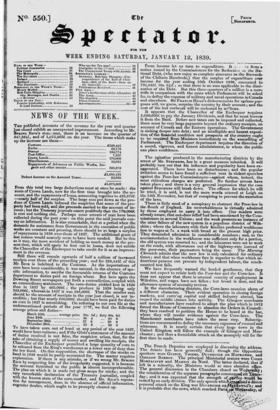The agitation produced in the manufacturing districts by the arrest
of Mr. STEPHENS, has in a great measure subsided. It will probably turn out that his influence and popularity have been ex- aggerated. There have been no disturbances ; and the popular irritation seems to have found a sufficient vent in violent speeches against the Poor-law Commissioners—against whom, indeed, the most ridiculous charges are preferred. No further arrests have taken place ; and there is a very general impression that the case against STEPHENS will break down. The offence for which he will be tried, it is said, is not the mere words uttered at Leigh on the 13th November, but that of conspiring to prevent the execution of the laws.
There is little need of a conspiracy to obstruct the Poor-law in the South of' England. Its unworkableness is virtually admitted by those employed to carry it into effect. Our readers were already aware, that out-door relief had been sanctioned by the Com- missioners in several Unions ; and the week presents an instance of the utter failure of the new system in a populous district of Wilt- shire ; where the labourers with their families preferred workhouse fare to wages at 7s. a week with bread at the present high price. They demanded admission in considerable numbers ; and, as the accommodation in the workhouse was sufficient only for a portion, the old system was resorted to ; and the labourers were set to work on the roads, with allowances out of the highway-rate instead of the poor-rate, their paymasters being the same. The Morning Chronicle admits that the new law is only calculated for ordinary times ; and that when workhouse fare is superior to that which in- dustrious persons can procure by independent labour, the much- vaunted test fails.
We have frequently warned the landed gentlemen, that they must not expect to retain both the Poor-law and the Corn-law. It
does not appear that there is unusual scarcity of employment in Wiltshire, and wages have not fallen ; but bread is dear, and the allowance system of necessity revives.
In the manufacturing districts, the Corn-laws occasion alarm of a different character. Their evident operation in closing foreign markets, and carry'ng capital and skilled industry abroad, has roused the middle classes into activity. The Glasgow merchants and manufacturers have resolved to adopt the plan which in 1812 forced the House of Commons to abandon the Orders in Council: they have resolved to petition the House to be heard at the bar, where they will tender evidence against the Corn-laws. The Manchester merchants have taken the same step. Subscrip- tions are commenced to defray the necessary expenses of counsel and witnesses. It is nearly certain that every large town in the United Kingdom will follow the example of' Glasgow and Man- chester; and thus a formidable attack on the monopoly will for the first time be made.


























